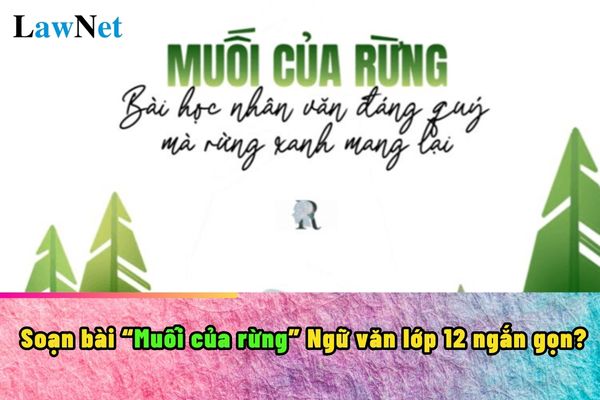What are guidelines on preparing the lesson "Muối của rừng" for grade 12 students in Vietnam? What are types of literary materials used for grade 12 Literature in Vietnam?
What are guidelines on preparing the lesson "Muối của rừng" for grade 12 students in Vietnam?
"Muối của rừng" is one of the texts that students will study in the Grade 12 Literature program.
Therefore, students can refer to the following lesson plan for "Muối của rừng" Grade 12 Literature:
|
Guidelines on preparing the lesson "Muối của rừng" for grade 12 students * Main Content of the Text: |
*Note: Information is for reference only.

What are guidelines on preparing the lesson "Muối của rừng" for grade 12 students in Vietnam? What are types of literary materials used for grade 12 Literature in Vietnam? (Image from the Internet)
What are contents of the Grade 12 Literature program in Vietnam?
Based on Subsection 2, Section 5 of the General Education Program for Literature issued with Circular 32/2018/TT-BGDDT, Grade 12 students will study the following in the Literature subject:
*VIETNAMESE LANGUAGE KNOWLEDGE
- Preserve and develop Vietnamese language
- Logical errors, vague sentences and ways to correct them
- Rhetorical devices of sarcasm, paradox: characteristics and effects
- Types of texts and genres
+ Argumentative texts: role of arguments, reasoning, and evidence; the purpose, emotions, and viewpoints of the writer; techniques to enhance assertion and negation in argumentative texts;
Reasons and expressive language; a speech at the launch of a movement or social activity; argumentative essays on issues relevant to the youth; comparative and evaluative essays on two literary works of the same or different genres
+ Informative texts: the value of the topic, the main information of the text; types of data and data reliability; job exchange letters; reports on project assignments or research results on a natural or social issue
- Respect and protection of intellectual property rights in learning and research
- Basic features of formal and informal language: understand and apply
- Non-verbal communication means: images, statistics, charts, diagrams,...
*LITERARY KNOWLEDGE
- Functions of cognition, education, and aesthetics in literature
- The relevance between the theme, ideology, and main inspiration
- Some expressions of artistic style in folk literature, medieval literature, modern literature, realistic and romantic tendencies; the author's artistic style
- Some elements of legendary stories, novels (modern and postmodern), modern lyrical poetry, comedy, diaries
+ Legendary stories: topics, characters, language, artistic techniques; evaluate the role of fantastical elements in legendary stories, relating to their role in folk tales
+ Novels (modern and postmodern): language, character psychology, actions
+ Modern lyrical poetry: language, images, symbols, elements of symbolism, surrealism
+ Comedy: language, characters, situations, comic techniques
+ Reports, diaries or memoirs: non-fictional nature, description, narration; combination of realistic details, events with the writer's experiences, attitudes, and evaluations
- Characters’ psychological developments and ways of expressing characters’ psychology by the writer
- The relationship of the storyteller, point of view in presenting the text's theme
- Basic understanding of Ho Chi Minh to help with reading and understanding some representative works of this author
- Basic overview of literary history and the role of foundational knowledge about literary history in reading and understanding literary texts.
What are types of literary materials used for grade 12 Literature in Vietnam?
Pursuant to Subsection 2, Section 5 of the General Education Program for Literature issued with Circular 32/2018/TT-BGDDT, the literary materials used for Grade 12 Literature include the following texts:
(1). Literary Texts
- Legendary stories, short stories, and modern novels
- Modern lyrical poetry
- Comedy
- Reports, diaries or memoirs
(2). Argumentative texts
- Social arguments
- Literary arguments
(3). Informative texts
- Explanatory texts incorporating one or more elements such as description, narration, expression, argumentation
- Research reports, job exchange letters.

